NAME: Cortisa Star
TRACK: Fun
YEAR: 2024
FROM: Delaware, USA
NAME: Cortisa Star
TRACK: Fun
YEAR: 2024
FROM: Delaware, USA
Check out our playlist #66 on YouTube, Spotify, Deezer and Apple Music with 20 tracks by international female and LGBTQIA rappers!
With:
NAME: Mia Snow
TRACK: Let’s Get It Let’s Go
YEAR: 2024
FROM: Jacksonville, FL/Atlanta, GA, USA
6 Egyptian female rappers you should know, selected from the 10 Egyptian artists listed on Madame Rap !
In Egypt, as everywhere in the world, female rappers are striving to gain acceptance on the largely male-dominated scene. Nevertheless, the country has been witnessing a powerful wave of artists who are shaking up the norms and redefining the musical landscape.
These MCs are breaking boundaries with their fearless lyrics, innovative styles and unique stories. Whether denouncing violence, addressing social and political issues or celebrating their own identity, these women use rap as a tool to amplify their voices and pave the way for future generations of female rappers.
With:
NAME: Lexa Gates
TRACK: Stupid
YEAR: 2024
FROM: Queens, New York, USA
Check out the first episode of Madame Talk Europe, the podcast that raises the visibility of queer and female rap artists in Europe!
In this first episode, we take a look at France.
According to a study by the National Music Center (CNM) entitled “Le rap dans l’écosystème musical français”, published in May 2024, rap is the musical genre that generated the highest number of streams per track in 2024: 6.4 million. Yet female and LGBT+ rappers remain largely invisible on this scene.
Hardly ever signed to major labels, given little coverage in the mainstream media, forgotten at festivals, women and queer artists seem almost non-existent.
Still according to the CNM study, in 2022, less than 2% of all rap tracks in the top 10,000 were by French female rappers. 15% of rap tracks produced and recorded in France were performed by “female leads”, and only 17% of rap track productions were performed by women.
Contrary to what these figures might suggest, female rappers do exist. Madame Rap lists almost 500 in France alone.
So where are they? Why are they still invisible? What responsibility do the various players in the music industry hold? What can be done to find alternative paths and still make it in a hostile system? Which solutions can be found?
Thérèse, committed multidisciplinary artist, and Antoine Dabrowski, editor-in-chief of Tsugi Radio, try to answer these questions.
Produced by Madame Rap and supported by the European Union via LIVEMX.


NOM : Mello Buckzz
TITRE : Player’s Club
ANNÉE : 2024
PAYS : Chicago, États-Unis
NAME: Jennie
TRACK: Mantra
YEAR: 2024
FROM: South Korea
NAME : Anycia
TRACK : DRIVE THRU
YEAR : 2024
FROM : Atlanta, USA
NAME: Erre Tres
TRACK: Principessa
YEAR: 2024
FROM : Mexico
NAME : Aleza
TRACK : Bad Bih
YEAR : 2024
FROM : Memphis, Tennessee, USA
Check out our playlist #65 on YouTube, Spotify, Deezer and Apple Music with 20 tracks by international female and LGBTQIA rappers!
With:
NAME: g9ngstab9by
TRACK: AI Freestyle
YEAR: 2024
FROM: Baltimore, MD, USA
NAME: Molly
TRACK: TARASFREESTYLE
YEAR: 2024
FROM: Spain
NAME: DEELA
TRACK: Kryptonite
YEAR: 2024
FROM: Lagos, Nigeria
For Bisexual Awareness Week (#BiWeek) and Bisexual Visibility Day, check out these 10 female rappers who identify as bisexual, selected from the 46 bi rappers listed on Madame Rap !

Paigey Cakey is a British rapper, singer and actress from Hackney, East London. Over the years, the independent artist has built a solid fan base from her mixtape/EP releases, sold out events and several acting credits in award winning Films and TV shows.
She says she likes “girls and guys”. (Pride Magazine, 2018)
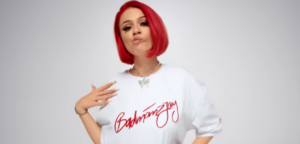
The German rapper Badmómzjay came out as bisexual at the age of 13 and launched her solo rap career at the end of 2019. The following year, things really took off for her. Her single “Ohne Dich” reached the top of the charts and went gold. On her debut album, released in 2021, she tackles anxiety attacks, painful losses and female empowerment.
In 2020, she aswered her fans’ questions on tellonym, and later published the Q&A session on Instagram. Asked about her bisexuality she explained:
“I don’t fall in love with genitals. I fall in love with people. The way people talk to me. How they act. How they deal with certain things. And not whether you’re a boy or a girl.”
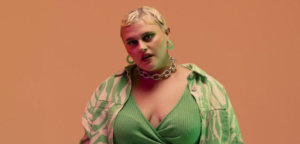
BigMama was born in Avellino, Italy, and settled in Milan in 2019. She stands out with her strong songs, even when dealing with intimate topics, and her mastery of the flow, wordplay, and language.
Openly bisexual, she revealed that she had to undergo chemotherapy sessions for cancer, that she was s*xually assaulted when she was 16 and was a victim of body shaming.
“I’m female, fat, rapper and queer: I have it all.” (iO Donna, 2024)
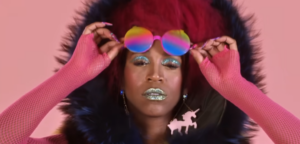
Brazilian rapper singer and songwriter Karol Conka blends modern rap with sounds from Brazilian pop and traditional music. In 2013, she won Multishow’s Best New Artist award and released her debut album, “Batuk Freak”.
Her album “Ambulante” was ranked as the 34th best Brazilian album of 2018 by the Brazilian edition of Rolling Stone.
She publicly came out as bisexual and is an advocate of feminism.
“I’ve always known I was bi, ever since I was little.” (Popline, 2016)

Amsterdam-based rapper Elmer debuted in 2021 with the viral hit “Je Vader” and has since been gaining ground on the Dutch music scene. Always playing with gender in her performances, she combines her love of social criticism and humor with honest lyrics.
She identifies as a bisexual woman.
“If there had been more words for it in my adolescence, I might have called myself non-binary. Now I mostly say queer, but all pronouns are OK.” (Het Parool, 2022).
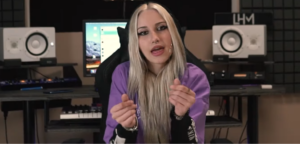
Attitude, wit and talent are the recipe with which Metrika is carving out a well-deserved place in the spotlight of the Spanish scene. The rapper from Castellón breaks with stereotypes and delivers incisive songs with a melancholic aura, which end up becoming true hymns.
She identifies as a bisexual woman.
“I don’t understand that there are still people who think that bisexuality is a stage, it is not (…). Stop hypersexualizing us bi girls and calling faggots the guys who are also bi”. (Shangay, 2024)
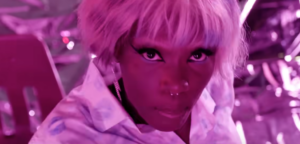
The American rapper and singer rose to prominence on TikTok with the viral success of her song “Yucky Blucky Fruitcake” in 2021. Doechii received platinum certification for her 2023 single “What It Is (Block Boy)” and was awarded the Rising Star Award from Billboard Women in Music the same year.
“I always knew that I was queer, and I was bisexual. But I didn’t really feel comfortable talking about it, because nobody around me was gay. So it’s not like I was hiding it — but I also wasn’t fully embracing it”. (GQ UK, 2022)
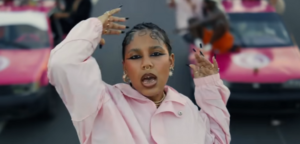
Dominican rapper Tokischa keeps reconstructing the perceptions and norms about women. The trap artist is not afraid of showing society everything she does, likes or is, promoting a lifestyle without hypocrisy, gender stereotypes and anti-norms.
“I would say that I am bisexual, I like men and women, and I feel very open with that.” (Diario Libre, 2023)
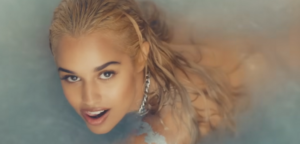
A Canadian rapper and model, Tommy Genesis incorporates experimental style and often sexual verses in her music. Gender and sexuality are common themes in her lyrics and she has described herself as a “fetish rapper”. She is also an advocate against girl-on-girl cyberbullying.
In a 2018 interview for Gay Times, when asked “as a bisexual woman of color, have you faced a lot of discrimination in your life?” she answered:
“I don’t walk around stating that I’m bisexual, so if someone’s read an article or listened to a song, or meets me on the street, I’m just me (…) I’m definitely proud of who I am, and I’m proud of how I identify, but it shouldn’t matter, and everyone should be treated with the same amount of respect.”
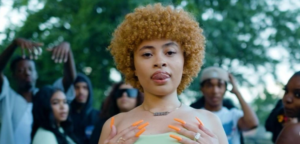
Born and raised in The Bronx, New York City, Ice Spice broke through in 2022 with her viral hit “Munch (Feelin’ U)”. She achieved further mainstream success with several collaborative singles with Nicki Minaj and Taylor Swift, which peaked within the top-ten of the Billboard Hot 100. This made her the first rapper to release four songs that achieved top-ten status in the same year.
Ice Spice has identified as bi and queer, stating in a podcast that she prefered “good girls and good boys” (Hot 97, 2023).
NAME: Whip The Rapper
TRACK: Screw
YEAR: 2024
FROM: Port Arthur, TX, USA
NAME : Benny Blanca
TRACK : Let’s Get It
YEAR : 2024
FROM : Jersey City, New Jersey, USA